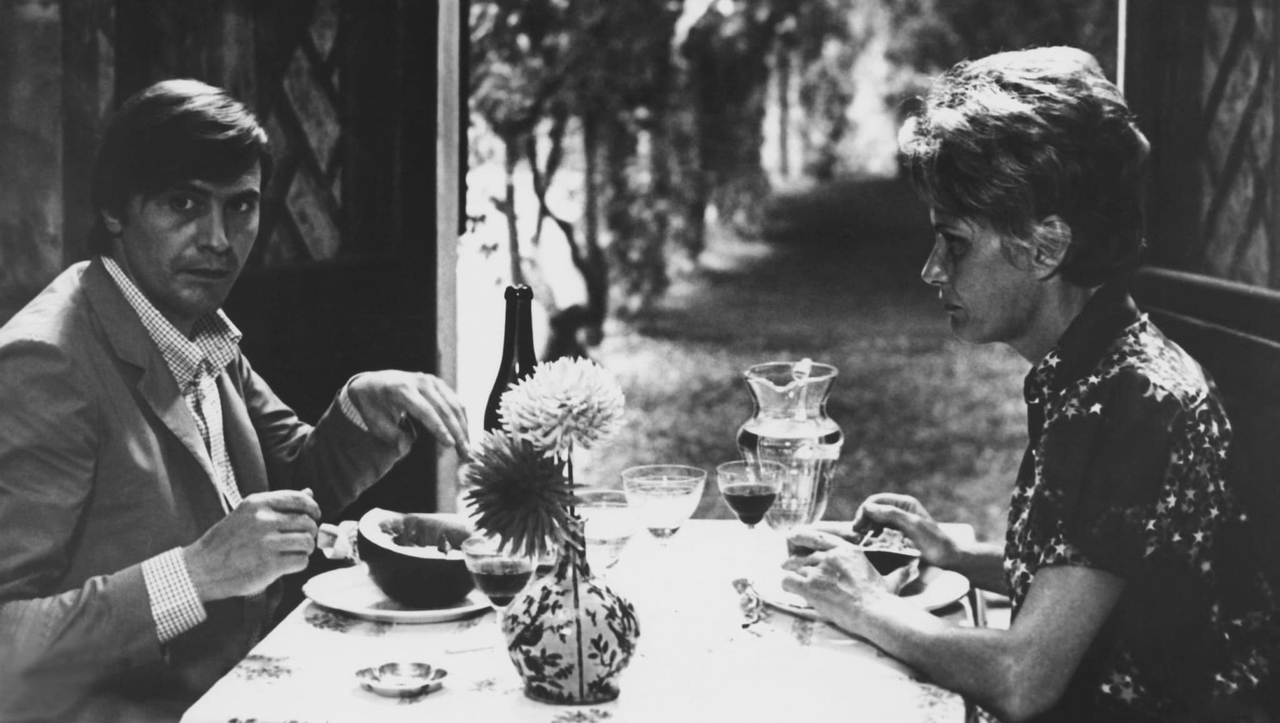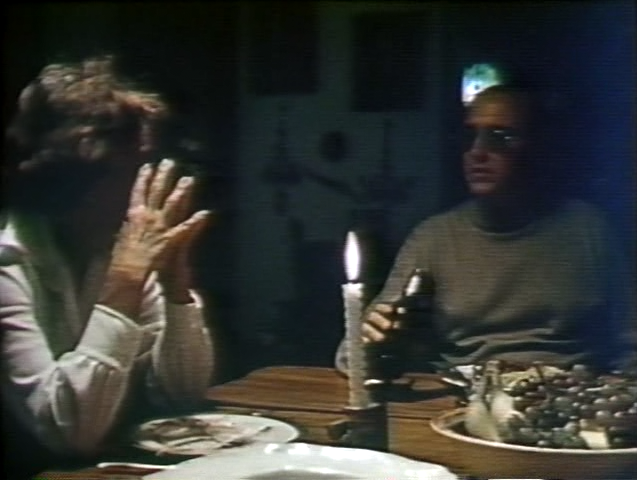“There's phrase that… 'A man is made of all men. He is equal to all and all are equal to him'.”Strategia del ragno The Spider's Stratagem] (Bernardo Bertolucci, 1970)
Apr
19
melon

Athos Magnani (Giulio Brogi) and Draifa (Alida Valli) sharing a meal. There's a carafe with water, a small vase with two flowers, wine glasses, and half a melon. Athos looks up, past us, towards something. DPs: Franco Di Giacomo & Vittorio Storaro.
– Athos Magnani
1970s
Série noire (Alain Corneau, 1979)
Apr
9
canned pilchards

Franck Poupart (Patrick Dewaere) about to dig into a can of pilchards. A pile of French women's magazine “marie claire” is next to him on an otherwise bare coffee table. DP: Pierre-William Glenn.
Max et les ferrailleurs [Max and the Junkmen] (Claude Sautet, 1971)
Mar
16

Lily (Schneider) and Max (Piccoli) at a small table decked with good food, good wine, and quite a few wads of cash. DP: René Mathelin.
“I look into the distance to the end of the world. Before the day is over, the end will come. First, time will tumble, and then the earth. The clouds will begin to race… the earth boils over; this is the sign. This is the beginning of the end. The world's edge begins to crumble… everything starts to collapse… tumbles, fall, crumbles and collapses. I look into the cataract. I feel an undertow, it draws me, it sucks me down. I began to fal, a vertigo seizes upon me.”Herz aus Glas [Heart of Glass] (Werner Herzog, 1976)
Mar
13
tea

A young maid (Sonja Skiba) holding a heavy tray with cups, plates, and various tea-related pottery. There's a somnambulist quality to her bearing. DP: Jörg Schmidt-Reitwein.
– Hias
Talpuk alatt fütyül a szél [The Wind Blows Under Your Feet] (György Szomjas, 1976)
Mar
11
wine

German lobby card. Two rough-looking Hungarian cowboys drink from wooden beakers at a small, wooden table. The man who has the carafe, also has the knife. DP: Elemér Ragályi.
“I'm young, hot and pissed off!”Avere vent'anni [To Be Twenty] (Fernando Di Leo, 1978)
Mar
9
sandwiches

Lia (Gloria Guida), one of the young, hot and pissed off 20-somethings, enjoys a sandwich with her espadrilles resting on a small restaurant table. Just visible in the background are multiple men on their lunchbreak. DP: Roberto Gerardi.
– Tina
破戒 [Po jie / Broken Oath] (Chang-hwa Jeong, 1977)
Feb
24
noodles

A large man at an eatery gulps down bowl after bowl of delicious noodles. He's at number seven with bowl eight ready to go. DPs: Tieh Wang & Yung-Lung Wang.
The Whole Shootin' Match (Eagle Pennell, 1978)
Feb
23
dinner with dad

Father and son at a small messy dinner table in a small kitchen. The dad, Frank (Sonny Carl Davis) is going on about something while the kid, T. Frank (David Weber), licks his finger. DP: Eagle Pennell.
“The popcorn you are eating has been pissed in. Film at eleven.”The Kentucky Fried Movie (John Landis, 1977)
Feb
9
popcorn

A white guy munches popcorn in a seemingly empty movie theatre while an usher, standing right behind him, lights a cigarette. DP: Stephen M. Katz.
– newscaster
